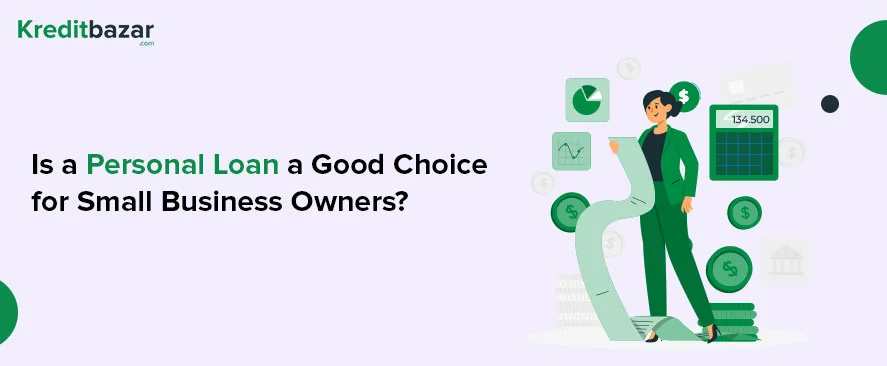![]()
Running a business is a challenging task. It requires a lot of patience, planning, time, and often a lot of money to run the day-to-day operations. When financing your business as a small business owner, consider seeking financial assistance, such as a business loan or a personal loan. A business loan is typically offered to established businesses with a minimum turnover requirement. Furthermore, the business profile, collateral offered, loan purpose, etc. are taken into account before the approval of a business loan. Qualifying for a business loan, however, can be challenging for a budding entrepreneur.
Fortunately, personal loans are a type of financing that individuals can use for various personal needs. But wait, can you use the personal loan to fund your business needs? The answer to this is that, since personal loans are so flexible, you are free to use the money you receive for business needs. In this article, we will look at some of the benefits of taking out a personal loan as a small business owner.
Benefits of Personal Loans for Small Business Owners
For many businesses in India, personal loans can be a very practical option. The funds received from personal loans can be used for various business needs, like covering operational costs, purchasing new machinery, or managing unexpected expenses. Here are some benefits of applying for a personal loan for your business needs.
Simplified Application Process
The application process for a personal loan is very straightforward. Typically, the process requires filling out an application form, submitting the required documents and waiting for approval. The documentation required for a personal loan is quite less extensive than that for a business loan, making it much easier for a business owner to apply.
Be very careful when filling out the application form. Double-check for typos and errors before submitting your application. If the lender discovers any discrepancies, your loan application will be rejected, resulting in a lowering of your CIBIL score. To save yourself from these simple but monotonous tasks, you can seek assistance from experts such as Kreditbazar, who not only provides a digital portal for easy loan processing but also assigns a dedicated expert to ensure you have no difficulties during any stage of your loan process.
Access to Quick Funding
As a small business owner, you may find yourself in need of short-term finances for various reasons. An instant personal loan can come to your rescue in this situation and help you meet all of your short-term financial needs. One significant advantage of personal loans is the quick approval process. Several banks and NBFCs offer instant approval and disbursal of personal loans, making it easier for small business owners to access the funds when they need them the most.
Kreditbazar, for example, collaborates with several NBFCs and can assist you in obtaining an instant personal loan from one of the NBFC partners where your profile meets the eligibility requirements. You can get the best offer aligned to your profile with a simple and quick online process.
Usage Flexibility
Compared to other types of loans, a personal loan provides greater flexibility in how you can use the funds. Be it business expansion, covering day-to-day operational costs, working capital, paying unexpected business expenses, or purchasing new equipment, a personal loan can be used and tailored to your needs, making it very useful for small business owners who need access to some quick funds. Traditional business loans, on the other hand, are often restricted and can only be used for the purpose for which the loan was obtained.
No Collateral
Unlike secured business loans or any other secure loans, personal loans don’t require any collateral. This can be beneficial for small business owners who do not have assets to offer or do not want to put their assets at risk by offering them as collateral.
While personal loans are convenient, they carry risks such as higher interest rates and stricter eligibility requirements. To mitigate these risks, it’s essential to maintain a good credit profile. A high credit score can help you qualify for more favourable loan terms and lower interest rates.
Lower Interest Rates Compared to Credit Cards
In India, personal loans usually come with lower interest rates compared to credit cards. This makes the personal loan a more cost-effective option for any business’s financial needs. Lower interest rates result in lower overall repayment costs, which ultimately benefit your financial health. By choosing a personal loan over a credit card, you can keep your business expenses manageable and avoid falling into a high-interest debt trap.
Building or Improving Credit History
Timely repayment of a personal loan can help you build or improve your CIBIL score. A higher credit score is important for both personal and business financial health because it opens the door to better loan terms and larger amounts in the future.
Flexibility in Loan Amounts
Personal loans start at Rs.50,000 and go up to Rs.50 lakh or more, allowing you to choose the appropriate loan size based on your business needs. Whether you need a small loan to cover day-to-day expenses or a larger amount for significant investments, personal loans offer the flexibility to choose what works best for you.
Before applying for a personal loan, determine your needs and calculate how much money you need. Also, determine how much you can afford in monthly repayments (EMI) and choose the loan tenure and amount accordingly. This will keep you from falling into a financial quagmire and allow you to carry on with your daily business operations without any financial issues.
Bridging Financial Gaps
Unexpected business expenses can occur at any time, and a personal loan can provide immediate relief in these unfortunate situations. Personal loans can help you manage your cash flow during lean times. Whether it’s a sudden equipment breakdown or an urgent need for additional inventory, personal loans can help you address these needs without disrupting your operations.
Potential Tax Benefits
A personal loan does not provide any specific tax benefits. However, there are some scenarios in which you can claim tax benefits for the intended use of the loan amount, and investing in a business is one of them. If you use a personal loan to invest in or start a business, you may be able to claim the interest paid as a business expense under Section 37 of the Income Tax Act.
What exactly does Section 37 of the Income Tax Act cover?
According to Section 37 of the Income Tax Act, any business expense that is used or allocated exclusively and totally for the operations of the business is deductible, except capital expenditures and the individual’s expenses. Furthermore, it will apply when calculating a company’s taxable income, which is payable under the heading “profits and gains of business or profession.”
Effective tax planning is critical for maximizing the benefits of personal loans. Consulting with a tax advisor can help you maximize any potential tax deductions and ensure you’re taking full advantage of your financial options.
Case Study of Personal Loans for Small Business Owners
Let us look at how Avinash, who runs a retail business in Mumbai, used a personal loan to boost sales.
Avinash owns a shop in a bustling Mumbai neighbourhood where he sells household items. The store was quite simple, which meant he did not have enough space to keep a variety of other items in his shop, resulting in a loss of business. He considered renovating his shop, making some furniture, and adding more shelves where he could store more items. The Carpenter estimated that it would cost around Rs.2 lakh to completely transform the shop’s appearance.
Avinash could not disrupt his savings and burn his pockets because he needed to run the shop as well as invest in inventory. He decided to avail a loan. With the funds from the personal loan, he made the planned investments in his shop as suggested by the carpenter, giving it more room to accommodate a wider range of products and, as a result, boosting sales dramatically.
Conclusion
Small business owners can benefit greatly from personal loans, which have lower interest rates than credit cards and provide quick access to funds as well as flexible usage options with no collateral requirements. These benefits make personal loans an attractive option for funding a variety of business needs. However, before applying for a personal loan, it’s important to assess your individual needs and financial situation. Personal loans can be a useful tool for financing businesses, but to make sure they support your objectives, it is important to select the correct lender, loan amount, and loan term.
At Kreditbazar, we collaborate with multiple NBFCs and offer the application entirely online, making it hassle-free and transparent. Make the most of our enriching collaboration to process your loan with multiple NBFCs with expert guidance, making your financial journey easier and your business prosper.
Frequently Asked Questions about Personal Loans for Small Business Owners
Q1. Is it advisable to take a personal loan for business?
Ans1. Yes, taking a personal loan for business can be advisable for small, urgent financial needs, especially for businesses without collateral or long credit history. However, personal loans often come with higher interest rates compared to business loans, so it’s important to assess the cost and feasibility.
Q2. Which loan is better for business?
Ans2. A business loan is generally better for business purposes as it offers more suitable terms such as lower interest rates, larger loan amounts, and repayment structures tailored to business needs. However, in urgent situations, a personal loan can also be considered.
Q3. Is personal loans high-risk?
Ans3. A personal loan can be considered high risk if not managed properly, as it carries higher interest rates, especially for those with lower credit scores. Additionally, failure to repay can negatively impact the borrower’s credit score.
Q4. Is a personal loan good or bad?
Ans4. A personal loan can be good if used for specific purposes such as debt consolidation or personal emergencies. However, it can be bad if misused or taken without considering the repayment capacity, leading to debt accumulation and high-interest payments.
Q5. What are the disadvantages of a business loan?
Ans5. Disadvantages of a business loan include the requirement for collateral, extensive documentation, and sometimes stricter eligibility criteria. Additionally, approval times can be longer compared to personal loans.
Q6. What is the difference between a personal loan and a business loan?
Ans6. A personal loan is typically unsecured and used for individual needs, with shorter repayment periods and higher interest rates. A business loan is designed for business purposes, often requiring collateral but offering larger loan amounts and more favourable terms.
Q7. What is the best loan option for a small business?
Ans7. The best loan option for a small business could be government-backed schemes like MUDRA loans or business term loans from banks and NBFCs. These options often offer lower interest rates and more favourable repayment terms.
Q8. How much turnover is required for a business loan?
Ans8. The required turnover for a business loan varies by lender, but typically, banks expect a business to have a minimum turnover of ₹1 lakh per annum. Some lenders may have higher or lower requirements based on the size and nature of the business.
Q9. Which private bank is best for a business loan?
Ans9. Private banks like HDFC Bank, ICICI Bank, and Axis Bank are often considered best for business loans due to competitive interest rates, flexible terms, and customer-friendly services.
Q10. What are the disadvantages of personal loans?
Ans10. Disadvantages of personal loans include higher interest rates compared to secured loans, shorter repayment periods, and potential negative impact on credit scores if not repaid on time.
Q11. Does personal loan affect CIBIL score?
Ans11. Yes, personal loans can affect your CIBIL score. Timely repayments improve your credit score, while missed payments or defaults can negatively impact it.
Q12. What is the riskiest loan?
Ans12. Payday loans are often considered the riskiest due to their extremely high interest rates and short repayment periods, which can lead to a debt trap if not managed properly.
Q13. How many years is a personal loan good for?
Ans13. Personal loans in India typically have a repayment tenure ranging from 1 to 5 years, though some lenders may offer longer periods based on the borrower’s profile.
Q14. What is the minimum salary to get a personal loan?
Ans14. The minimum salary required to get a personal loan in India is usually around ₹25,000 per month, though this can vary depending on the lender and loan amount.
Q15. When should you not take a loan?
Ans15. You should avoid taking a loan if you have an unstable income, a high debt-to-income ratio, or if you’re uncertain about your ability to repay on time, as it can lead to financial strain and damage your credit score.
Q16. Which loan is cheaper personal or business?
Ans16. Business loans are generally cheaper than personal loans as they come with lower interest rates, especially when collateral is involved or when government-backed schemes are available.
Q17. Can I take a Personal Loan for business?
Ans17. Yes, you can take a personal loan for business purposes, but it’s advisable only for small and urgent needs since personal loans typically carry higher interest rates than business loans.
Q18. Who is eligible for a small business loan?
Ans18. Eligibility for a small business loan typically requires a minimum business turnover, stable business vintage (at least 2-3 years), and good credit history. Additional criteria depend on the lender’s specific requirements.
Q19. Which loan is best for business?
Ans19. For small businesses, term loans, working capital loans, and government-backed loans like MUDRA or CGTMSE are considered best due to their favourable terms and lower interest rates.
Q20. How much loan can I get to start a business?
Ans20. The loan amount for starting a business depends on the lender and the business plan. In India, small business loans can range from ₹50,000 to ₹10 crores, depending on the type of loan and business requirements.
Q21. Should I use my own money to start a business?
Ans21. Using your own money (bootstrapping) to start a business is a viable option if you have enough savings and want to avoid debt. However, it limits the growth potential compared to external financing options.
Q22. What is the monthly EMI for a 1 lakh personal loan?
Ans22. The monthly EMI for a ₹1 lakh personal loan depends on the interest rate and tenure. For example, at a 10% interest rate with a 1-year tenure, the EMI would be approximately ₹8,792.
Q23. How much ITR is required for a business loan?
Ans23. Most banks require at least 2-3 years of ITR filings for business loans, showing a minimum annual income or profit of ₹1.5 lakh or more, depending on the lender.
Q24. How much ITR is required for a personal loan?
Ans24. For a personal loan, lenders typically require at least 1 year of ITR showing an annual income of ₹2-3 lakh, though this varies by lender and loan amount.
Q25. How much salary is required for a 5 lakh personal loan?
Ans25. To get a ₹5 lakh personal loan, a salary of ₹30,000 to ₹50,000 per month is typically required, depending on the lender’s policies and interest rates.
Q26. How much salary is required for a 20 lakh personal loan?
Ans26. A salary of ₹75,000 to ₹1 lakh per month is generally required for a ₹20 lakh personal loan, though this may vary depending on the lender.
Q27. How much salary is required for a 10 lakh personal loan?
Ans27. For a ₹10 lakh personal loan, a salary of ₹50,000 to ₹75,000 per month is typically required.
Q28. Is 700 a good CIBIL score for a personal loan?
Ans28. Yes, a CIBIL score of 700 is considered good and should make you eligible for a personal loan, though the interest rate might vary depending on the lender.
Q29. Is 720 a good CIBIL score for a personal loan?
Ans29. Yes, a CIBIL score of 720 is a strong score, and most lenders will approve a personal loan with favourable terms at this score.
Q30. Is a personal loan bad for credit?
Ans30. A personal loan can negatively impact your credit if not repaid on time. However, timely payments can boost your credit score over time.
Q31. Is there any loan for small businesses?
Ans31. Yes, small businesses can avail themselves of various loans such as MUDRA loans, MSME loans, working capital loans, and equipment financing from banks and NBFCs.
Q32. What is the difference between a personal loan and a private loan?
Ans32. A personal loan is typically unsecured and provided by banks or NBFCs, while a private loan may be secured or unsecured and offered by private lenders or individuals with more flexible but potentially higher-risk terms.
Q33. Is a PF statement required for a personal loan?
Ans33. A PF statement is not usually required for a personal loan application. However, lenders may ask for income proof, bank statements, and other financial documents.
Q34. What is the minimum turnover for a business loan?
Ans34. The minimum turnover required for a business loan is typically ₹1 lakh per annum, though this varies by lender and the size of the loan.
Q35. What is the minimum loan amount for a business?
Ans35. The minimum loan amount for business loans can start from as low as ₹50,000, depending on the lender and the loan type.




